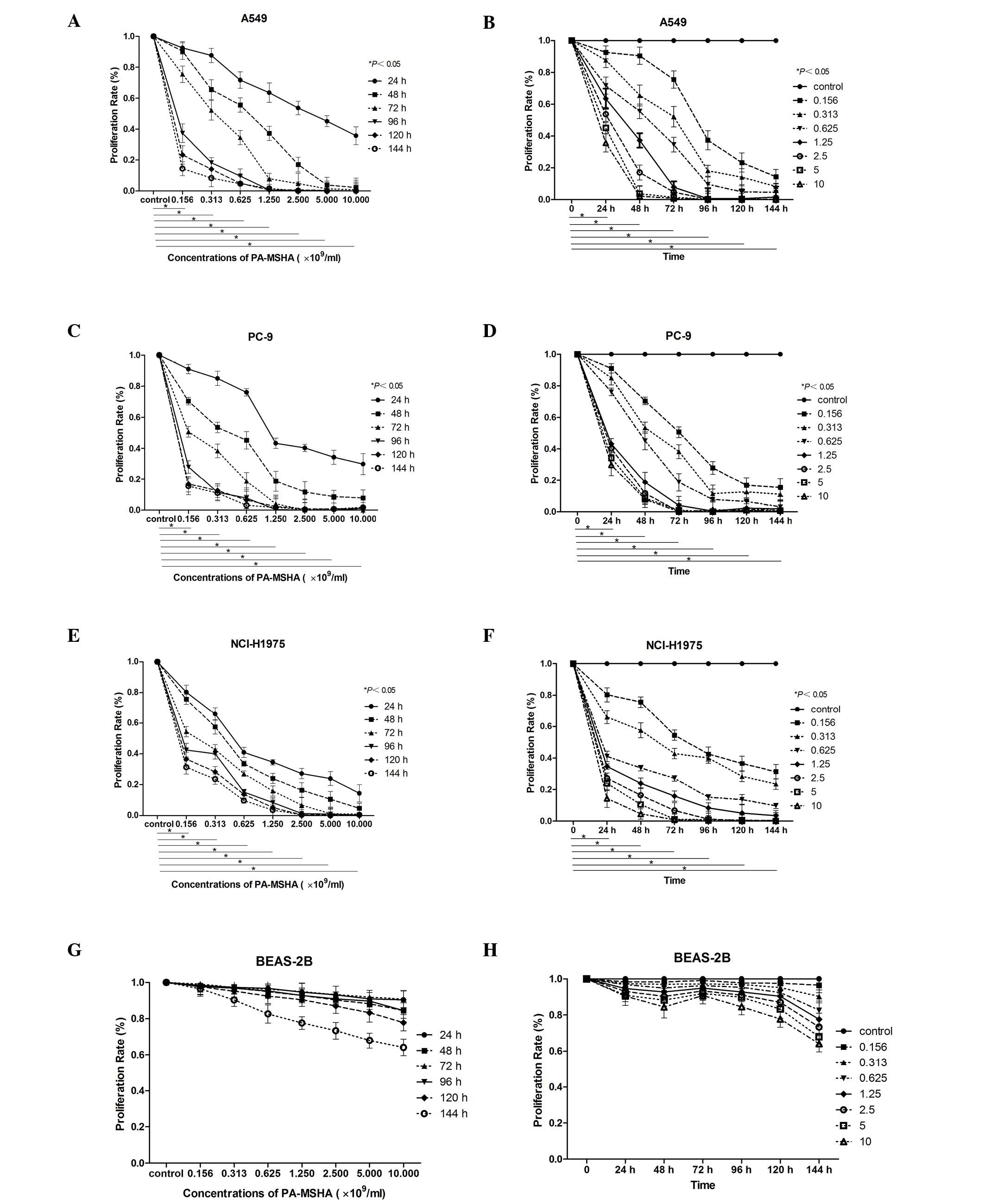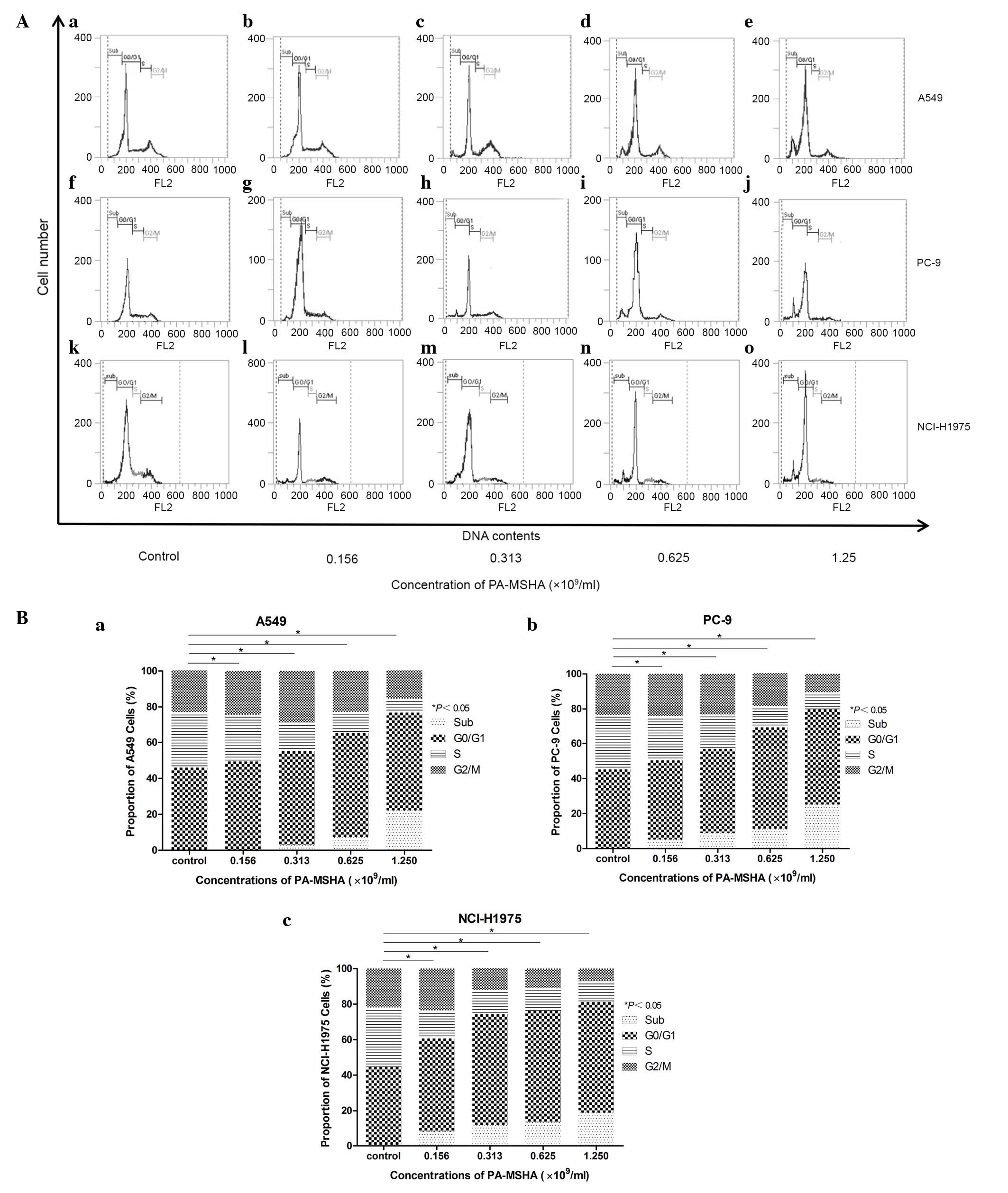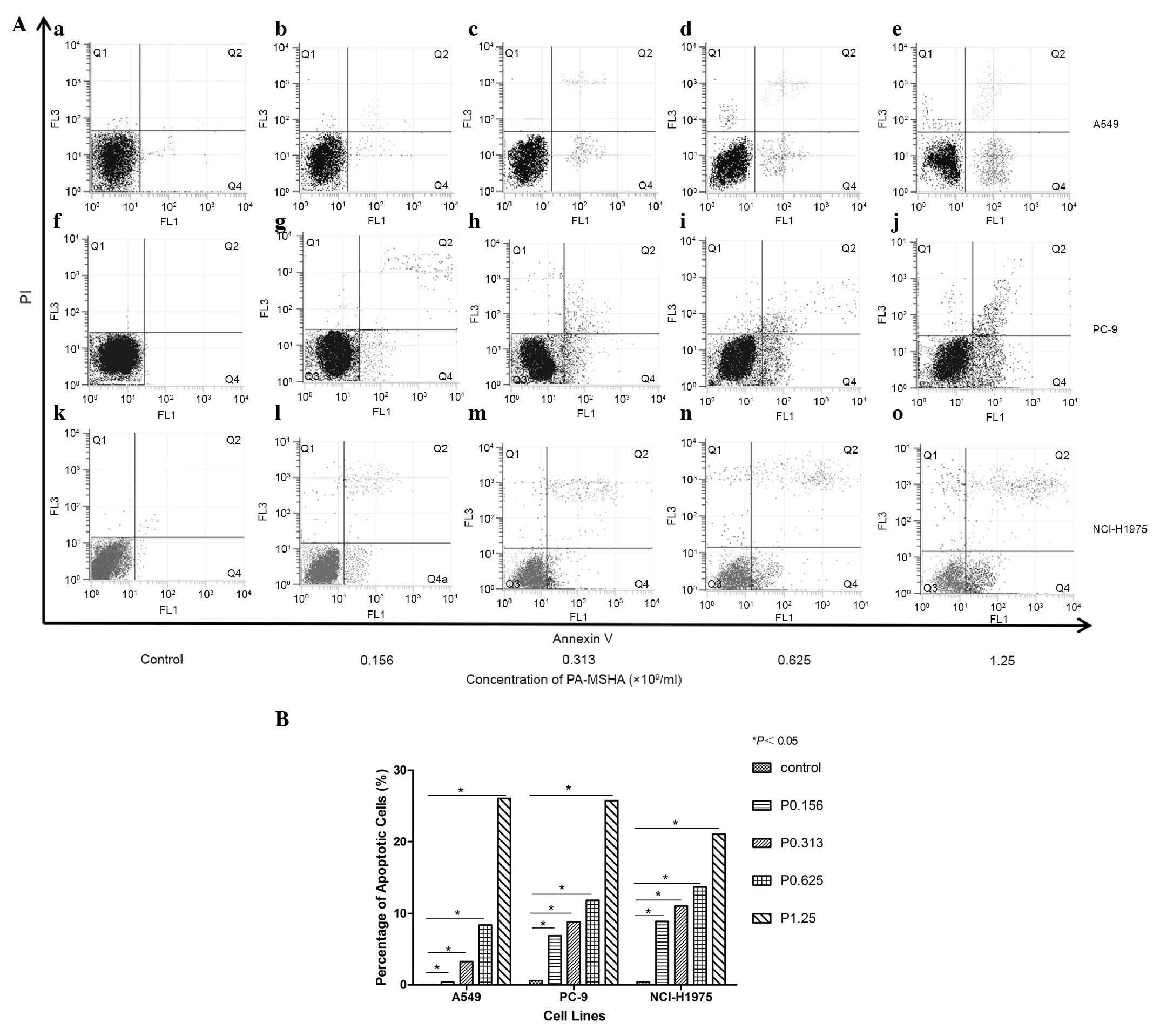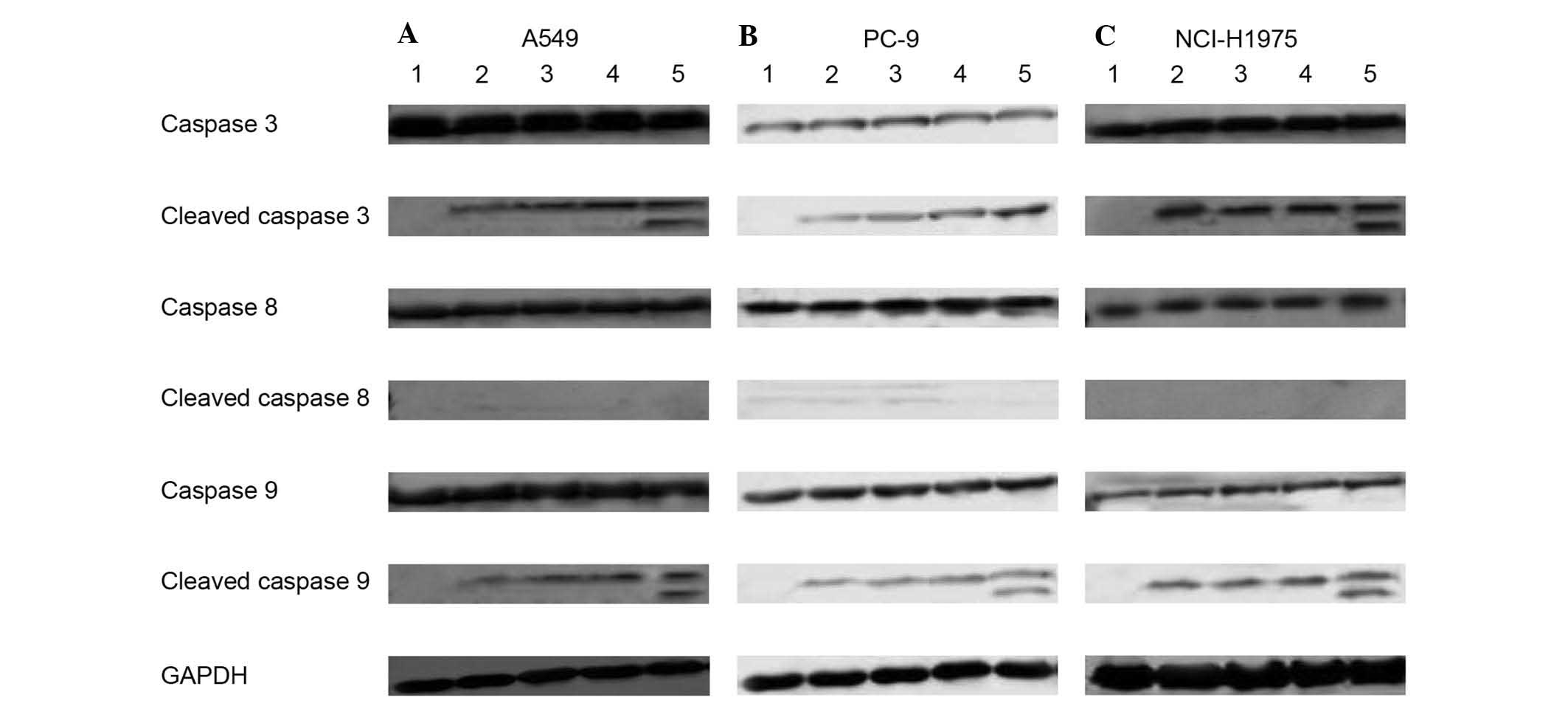|
1
|
Siegel R, Naishadham D and Jemal A: Cancer
statistics, 2012. CA Cancer J Clin. 62:10–29. 2012. View Article : Google Scholar : PubMed/NCBI
|
|
2
|
Siegel R, Desantis C, Virgo K, Stein K,
Mariotto A, Smith T, Cooper D, Gansler T, Lerro C, Fedewa S, et al:
Cancer treatment and survivorship statistics, 2012. CA Cancer J
Clin. 62:220–241. 2012. View Article : Google Scholar : PubMed/NCBI
|
|
3
|
Harari PM, Allen GW and Bonner JA: Biology
of interactions: Antiepidermal growth factor receptor agents. J
Clin Oncol. 25:4057–4065. 2007. View Article : Google Scholar : PubMed/NCBI
|
|
4
|
Hynes NE and Lane HA: ERBB receptors and
cancer: The complexity of targeted inhibitors. Nat Rev Cancer.
5:341–354. 2005. View
Article : Google Scholar : PubMed/NCBI
|
|
5
|
Fukuoka M, Wu YL, Thongprasert S,
Sunpaweravong P, Leong SS, Sriuranpong V, Chao TY, Nakagawa K, Chu
DT, Saijo N, et al: Biomarker analyses and final overall survival
results from a phase III, randomized, open-label, first-line study
of gefitinib versus carboplatin/paclitaxel in clinically selected
patients with advanced non-small-cell lung cancer in Asia (IPASS).
J Clin Oncol. 29:2866–2874. 2011. View Article : Google Scholar : PubMed/NCBI
|
|
6
|
Mendelsohn J and Baselga J: Status of
epidermal growth factor receptor antagonists in the biology and
treatment of cancer. J Clin Oncol. 21:2787–2799. 2003. View Article : Google Scholar : PubMed/NCBI
|
|
7
|
Engelman JA and Jänne PA: Mechanisms of
acquired resistance to epidermal growth factor receptor tyrosine
kinase inhibitors in non-small-cell lung cancer. Clin Cancer Res.
14:2895–2899. 2008. View Article : Google Scholar : PubMed/NCBI
|
|
8
|
Li D, Ambrogio L, Shimamura T, Kubo S,
Takahashi M, Chirieac LR, Padera RF, Shapiro GI, Baum A,
Himmelsbach F, et al: BIBW2992, an irreversible EGFR/HER2 inhibitor
highly effective in preclinical lung cancer models. Oncogene.
27:4702–4711. 2008. View Article : Google Scholar : PubMed/NCBI
|
|
9
|
Hirsch FR, Varella-Garcia M, Bunn PA Jr,
Di Maria MV, Veve R, Bremmes RM, Barón AE, Zeng C and Franklin WA:
Epidermal growth factor receptor in non-small-cell lung carcinomas:
Correlation between gene copy number and protein expression and
impact on prognosis. J Clin Oncol. 21:3798–3807. 2003. View Article : Google Scholar : PubMed/NCBI
|
|
10
|
Takezawa K, Okamoto I, Tanizaki J, Kuwata
K, Yamaguchi H, Fukuoka M, Nishio K and Nakagawa K: Enhanced
anticancer effect of the combination of BIBW2992 and thymidylate
synthase-targeted agents in non-small cell lung cancer with the
T790M mutation of epidermal growth factor receptor. Mol Cancer
Ther. 9:1647–1656. 2010. View Article : Google Scholar : PubMed/NCBI
|
|
11
|
Miller VA, Hirsh V, Cadranel J, Chen YM,
Park K, Kim SW, Zhou C, Su WC, Wang M, Sun Y, et al: Afatinib
versus placebo for patients with advanced, metastatic
non-small-cell lung cancer after failure of erlotinib, gefitinib,
or both, and one or two lines of chemotherapy (LUX-Lung 1): A phase
2b/3 randomised trial. Lancet Oncol. 13:528–538. 2012. View Article : Google Scholar : PubMed/NCBI
|
|
12
|
Zhao M, Yang M, Ma H, Li X, Tan X, Li S,
Yang Z and Hoffman RM: Targeted therapy with a Salmonella
typhimurium leucine-arginine auxotroph cures orthotopic human
breast tumors in nude mice. Cancer Res. 66:7647–7652. 2006.
View Article : Google Scholar : PubMed/NCBI
|
|
13
|
Maletzki C, Linnebacher M, Kreikemeyer B
and Emmrich J: Pancreatic cancer regression by intratumoural
injection of live Streptococcus pyogenes in a syngeneic mouse
model. Gut. 57:483–491. 2008. View Article : Google Scholar : PubMed/NCBI
|
|
14
|
Baban CK, Cronin M, O'Hanlon D, O'Sullivan
GC and Tangney M: Bacteria as vectors for gene therapy of cancer.
Bioeng Bugs. 1:385–394. 2010. View Article : Google Scholar : PubMed/NCBI
|
|
15
|
Zhao M, Geller J, Ma H, Yang M, Penman S
and Hoffman RM: Monotherapy with a tumor-targeting mutant of
Salmonella typhimurium cures orthotopic metastatic mouse models of
human prostate cancer. Proc Natl Acad Sci USA. 104:10170–10174.
2007. View Article : Google Scholar : PubMed/NCBI
|
|
16
|
Crull K and Weiss S: Antibiotic control of
tumor-colonizing Salmonella enterica serovar Typhimurium. ExpBiol
Med (Maywood). 236:1282–1290. 2011. View Article : Google Scholar
|
|
17
|
Hayashi K, Zhao M, Yamauchi K, Yamamoto N,
Tsuchiya H, Tomita K and Hoffman RM: Cancer metastasis directly
eradicated by targeted therapy with a modified Salmonella
typhimurium. J Cell Biochem. 106:992–998. 2009. View Article : Google Scholar : PubMed/NCBI
|
|
18
|
Yam C, Zhao M, Hayashi K, Ma H, Kishimoto
H, McElroy M, Bouvet M and Hoffman RM: Monotherapy with a
tumortargeting mutant of S. typhimurium inhibits liver metastasis
in a mouse model of pancreatic cancer. J Surg Res. 164:248–255.
2010. View Article : Google Scholar : PubMed/NCBI
|
|
19
|
Kreikemeyer B, Klenk M and Podbielski A:
The intracellular status of Streptococcus pyogenes: Role of
extracellular matrix-binding proteins and their regulation. Int J
Med Microbiol. 294:177–188. 2004. View Article : Google Scholar : PubMed/NCBI
|
|
20
|
Wang J, Wu D and Chen L: Pseudomonas
aeruginosa vaccine inhibits the proliferation of human
nasopharyngeal cancer cells in vitro. Nan Fang Yi Ke Da Xue Xue
Bao. 32:544–547. 2012.(In Chinese). PubMed/NCBI
|
|
21
|
Liu ZB, Hou YF, Di Min-Dong GH, Wu J, Shen
ZZ and Shao ZM: PA-MSHA inhibits proliferation and induces
apoptosis through the up-regulation and activation of caspases in
the human breast cancer cell lines. J Cell Biochem. 108:195–206.
2009. View Article : Google Scholar : PubMed/NCBI
|
|
22
|
Liu ZB, Hou YF, Zhu J, Hu DL, Jin W, Ou
ZL, Di GH, Wu J, Shen ZZ and Shao ZM: Inhibition of EGFR pathway
signaling and the metastatic potential of breast cancer cells by
PA-MSHA mediated by type 1 fimbriae via a mannose-dependent manner.
Oncogene. 29:2996–3009. 2010. View Article : Google Scholar : PubMed/NCBI
|
|
23
|
Li Z, Hao D, Zhang H, Ren L, Yang Y, Li L,
Chai J, Zhou X and Fu L: A clinical study on PA-MSHA vaccine used
for adjuvant therapy of lymphoma and lung cancer. Hua Xi Yi Ke Da
Xue Xue Bao. 31:334–337. 2000.(In Chinese). PubMed/NCBI
|
|
24
|
Chen WD, Tang ZH and Xu F: Application of
PA-MSHA vaccine adjuvant therapy and TAC scheme for treatment of
breast carcinoma. Nan Fang Yi Ke Da Xue Xue Bao. 29:1204–1207.
2009.(In Chinese). PubMed/NCBI
|
|
25
|
Philchenkov AA: Caspases as regulators of
apoptosis and other cell functions. Biochemistry (Mosc).
68:365–376. 2003. View Article : Google Scholar : PubMed/NCBI
|
|
26
|
Mathiasen IS and Jäättelä M: Triggering
caspase-independent cell death to combat cancer. Trends Mol Med.
8:212–220. 2002. View Article : Google Scholar : PubMed/NCBI
|
|
27
|
Tretiakova I, Blaesius D, Maxia L,
Wesselborg S, Schulze-Osthoff K, Cinatl J Jr, Michaelis M and Werz
O: Myrtucommulone from Myrtus communis induces apoptosis in cancer
cells via the mitochondrial pathway involving caspase-9. Apoptosis.
13:119–131. 2008. View Article : Google Scholar : PubMed/NCBI
|
|
28
|
Hegardt C, Andersson G and Oredsson SM:
Different roles of spermine in glucocorticoid- and Fas-induced
apoptosis. Exp Cell Res. 266:333–341. 2001. View Article : Google Scholar : PubMed/NCBI
|


















